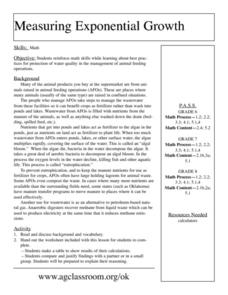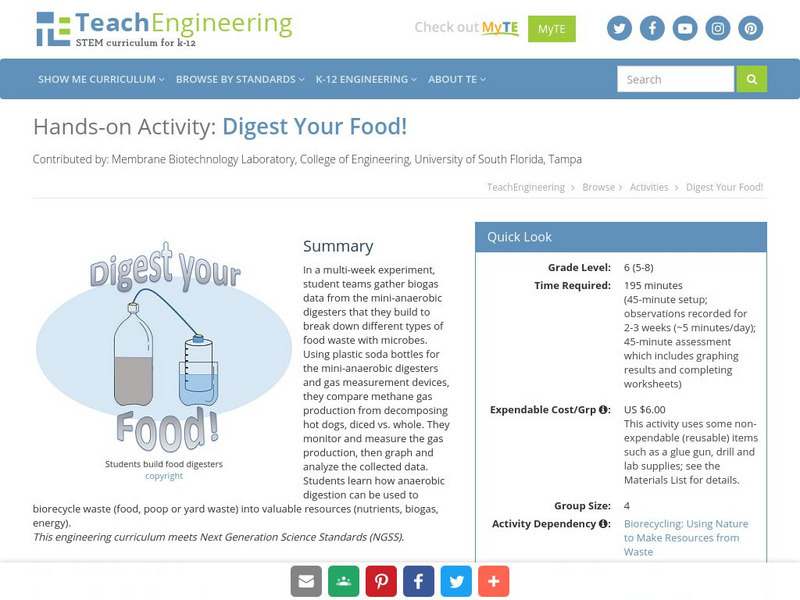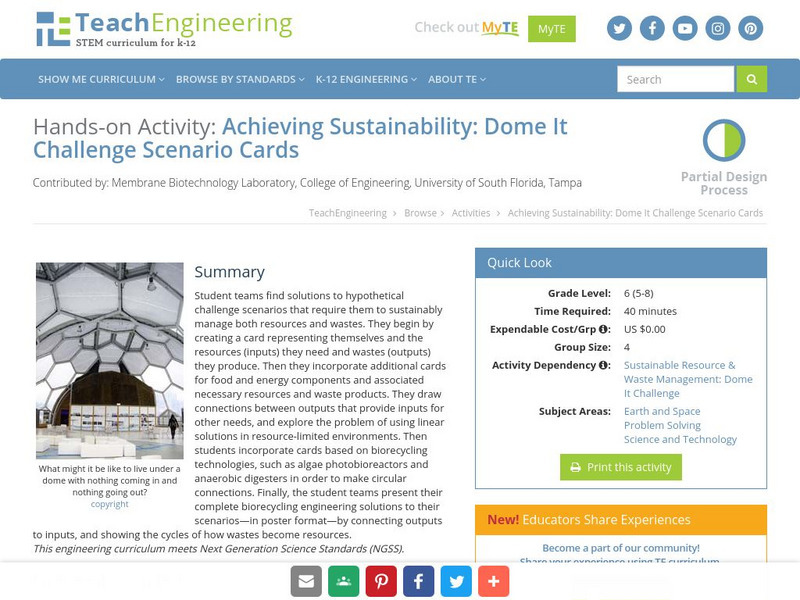Curated OER
Aerobic and Anaerobic Conditioning
Students view the A.D.A.M. computer simulation of aerobic and anaerobic exercise. They break into groups and members brainstorm and list as many aerobic and anaerobic exercises as possible in five minutes.
Curated OER
Measuring Exponential Growth
Students reinforce math skills while learning about best practices
for protection of water quality in the management of animal feeding
operations. They make a table to show results of their calculations and compare and justify findings...
K20 LEARN
Microbes and Manure = Biofuel
Waste not, want not! Science scholars explore manure as an alternative energy source through reading and experimentation. Groups construct their own biofuel digesters and observe the process of methane production. The teacher's guide...
National Renewable Energy Laboratory
Biomass: Biogas Generator
It's a gas. Middle schoolers build a biogas generator following the directions in this resource. After a few days of observation, they demonstrate that the gas given off by the decomposing manure is flammable. The activity concludes as...
Curated OER
Cellular Respiration: Harvesting Chemical Energy
A complete overview of oxidation, reduction, and how electrons are moved in respiration. You could use this slide show to elaborate on the concept of harvesting stored energy, and to summarize the stages of aerobic and anaerobic metabolism.
Curated OER
How Cells Harvest Energy
Survey the metabolism process from respiration through the production of the ATP molecule with this seven page AP biology worksheet. Pupils write short answers on the lines provided and label a diagram of the cellular respiration process.
Curated OER
A Design You’ll Dig: Designing a Habitat for Worms
Students discover how worms contribute to the balance of the environment. In this composting lesson, students study the composting and decomposition processes. Students then create habitats for worms that allow them to do their jobs.
Re Energy
Build Your Own Biogas Generator
What is biogas and how is it made? After examining background information about the sources of biogas and biogas generators, class members follow the provided information and build a biogas generator that can be used in the classroom.
Green Learning
Build Your Own Biogas Generator
Where this is not exactly a lesson plan, it is a terrific outline of how to generate biogas from an animal manure sample. If you are up for the challenge, the generator can be built by your class as a concluding project at the end of an...
TeachEngineering
Teach Engineering: Digest Your Food!
In a multi-week experiment, student teams gather biogas data from the mini-anaerobic digesters that they build to break down different types of food waste with microbes. They compare methane gas production from decomposing hot dogs,...
State Energy Conservation Office-Texas
State Energy Conservation Office: Energy Sources: Biomass: Manure for Fuel
Texas is famous for its cattle ranches, and all those cattle produce a lot of manure. Texans are working on projects to harness the energy in manure in various ways. Dry manure has been and continues to be burned for heating and cooking....
TeachEngineering
Teach Engineering: Biorecycling: Using Nature to Make Resources From Waste
By studying key processes in the carbon cycle, such as photosynthesis, composting, and anaerobic digestion, young scholars learn how nature and engineers biorecycle carbon.
TeachEngineering
Teach Engineering: Dome It Challenge Scenario Cards
Student teams find solutions to hypothetical challenge scenarios that require them to sustainably manage both resources and wastes.














